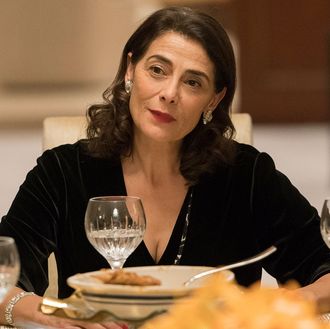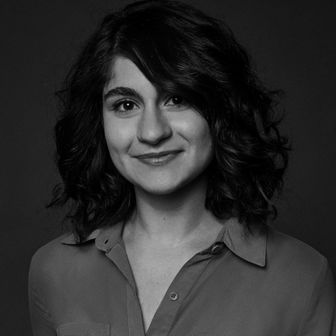
Succession, HBO’s runaway hit of the season, is a comedy-drama about the dark family dynamics at play as Logan Roy’s (Brian Cox) four children fight for a piece of power in their father’s media empire. Everyone is exorbitantly wealthy and everyone has serious issues — except, it seems, Marcia Roy. As Logan’s third wife, she’s an elegant and preternaturally calm force in the center of the storm.
Hiam Abbass, the Palestinian actress and director who portrays Marcia, has had an illustrious career starring in various acclaimed independent films like Paradise Now, Amreeka, and The Syrian Bride. In Succession, she’s tackling her first major TV role. Following last night’s electrifying season finale, she talks about being the most mysterious character on the show, her love of family dramas, and representation in film.
This is your first major TV role — what have you found yourself enjoying about the medium versus film?
I find it very interesting to live a longer while with a character, and discover things about her. It’s almost like you give her a longer life because, in a movie, you just know where she starts and where she ends. In a series, it’s always an open door and you don’t know what path your character is going to go through, which I find very intriguing as an actor.
Something I noticed about Marcia is that she has a bit of an affinity for Tom, even if she doesn’t like his fiancée, her stepdaughter Shiv, very much. Why do you think that is?
I don’t know exactly what attracts her to Tom, specifically, but I think maybe for her Tom is a gate towards Shiv, who feels, like, always in competition with Marcia. She wants to know so much about her, and I think Marcia’s a genuinely clear woman, though she has her mysterious side. But I think her mysterious side comes from her background that she holds within her and doesn’t necessarily want to talk about or make discoverable to the world. Tom is easier to communicate with, and his relationship with Shiv maybe helps her get closer to Shiv at some times when she would need it. Though I don’t think she really needs any specific relationship with Shiv because, for her, every member of this family is part of her world because she loves the father and she feels like she has to be with them all her life. If I really dig deep inside Marcia, I think she would rather live in peace with these guys rather than a war. But if you tickle her, she will respond.
Yes, I loved the scene before the wedding where she tells Shiv off in the staircase. I thought that was very satisfying as a viewer.
It was fun to do as well. It’s really funny because Sarah [Snook] and I get on really well with each other and every time we had these kind of scenes it was just funny how you play against what you developed in your relationship in real life. We’re good friends, and I consider her a great actress and a great woman, but it’s really funny how our two characters have to be sneaking on each other.
Do you have a personal favorite character?
I love them all to be honest with you, but I specifically love Logan’s character because of the complexity. It’s a Shakespearean character for me, it reminds me of these kind of of heavy, well-written theatrical characters.
What are some of your other favorite family dramas?
Funny enough, I’m going to talk about myself for two seconds. I’m a director and I was always really intrigued by families because we always have questions and interrogations about where we come from and what we want in life and how do we get on with one another in one family. We could be so different, but we still have to love each other. It’s almost the law of life, in a way. My first feature was about a family drama that I had to go through in order to even be able to direct anything afterwards. I’m very intrigued by this because of my background and where I come from and I find a real connection between me as a human being and family dramas, because they always bring me to understand more about myself and my relationships with my own.
My mom is Egyptian, so I’ve grown up watching you in a lot of Arab independent films. Do you have any thoughts on representation for Middle Eastern actors, or what you’d like to see more of?
I never really considered my job that way and I have a feeling that because of the parts that I’ve done, a lot of people see me maybe as some kind of representation of the Arab actress who now works with Hollywood or HBO. This is something I really have a hard time with because, first, I don’t see myself as a representation of anything and I don’t think really I’m looking necessarily for any kind of representation in the world of cinema or TV apart from being yourself.
I think if you are an engaged person towards what’s going on in the world around you, somehow you represent this in your work. For me, it’s the most important thing to be doing because — if you’re sincere and if you’re honest about what you see — then you know you’re [acting] in real virtue and real truth towards your own people, your roots, and the way you represent them to the world that maybe doesn’t know everything about them. This is the most important representation for me.
And film can be a powerful medium for that.
Exactly. I think in movies we bring out stories that point to the human as an individual and not a mass. Because I think the problem of the media is we see a lot of nations and situations and wars as if people were numbers and weren’t real individual stories with real individual journeys. I think movies can help the world see these kind of numbers in an individual way, where they can connect with their own journeys and their own stories. The humanity comes out from the telling of their stories.


